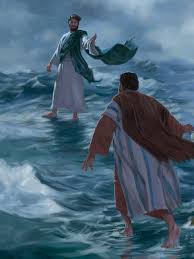
Today’s post is about the impetuous Peter. The disciple who refused to allow Jesus to wash his feet, then wanted Jesus to wash his whole body which garnered a double-redirection from Jesus (John 13:6-10). The disciple who rebuffed Jesus when he spoke of his death, earning him a stiff reprimand from Jesus (Matthew 16:22-23). The disciple who cut off the ear of a servant of the high priest, which Jesus rebuked firmly (Luke 22:49-50). The disciple who returned to his profession of fishing when he had been called to be a fisher of men (John 21:3).
The same disciple who professed that Jesus is the Messiah, God the Son (Matthew 16:16). The same disciple who continued to follow Jesus, if only from afar, after Jesus’ arrest (Luke 22:54-62). The same disciple who immediately ran to the tomb after the women told him it was empty (Luke 24:12). The same disciple who jumped into the water to get to shore faster in order to see Jesus sooner (John 21:6).
Peter was impetuous, often doing things immediately without thinking things through. After the miracle of feeding 5,000 men plus women and children (Matthew 14:13-21), Jesus sent his disciples on a boat to Bethsaida. Jesus went to pray alone. In the early  morning hours (between 3 A.M. and 6 A.M.), the wind had prevented the disciples from making much headway on the Sea of Galilee. Jesus began walking on the water, intending to pass by them in order to make a demonstration of his deity. Instead of being impressed by the power of Jesus over the fluidity and instability of water, they imagined him to be a ghost and became afraid. You cannot really blame the disciples, though. They had been in a boat all night on a lake that is only 64 square miles large, roughly the size of Liechtenstein. There was a tremendous headwind preventing the
morning hours (between 3 A.M. and 6 A.M.), the wind had prevented the disciples from making much headway on the Sea of Galilee. Jesus began walking on the water, intending to pass by them in order to make a demonstration of his deity. Instead of being impressed by the power of Jesus over the fluidity and instability of water, they imagined him to be a ghost and became afraid. You cannot really blame the disciples, though. They had been in a boat all night on a lake that is only 64 square miles large, roughly the size of Liechtenstein. There was a tremendous headwind preventing the 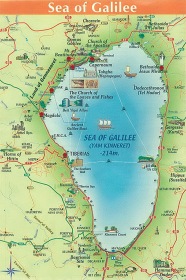 boat from making much progress. Waves were buffeting the boat. It is quite possible the disciples saw some supernatural force at work in the wind, preventing them from getting to where Jesus had sent them. A mysterious image walking on the water must have confirmed their fears.
boat from making much progress. Waves were buffeting the boat. It is quite possible the disciples saw some supernatural force at work in the wind, preventing them from getting to where Jesus had sent them. A mysterious image walking on the water must have confirmed their fears.
“But when t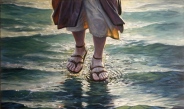 he disciples saw him walking on the sea, they were terrified, and said, ‘It is a ghost!’ and they cried out in fear” (Matthew 14:26). How soon the disciples forgot that Jesus had calmed the wind and the waves before. “Who then is this, that even the wind and the sea obey him?” (Mark 4:41). They had just seen Jesus demonstrate his power by feeding 5,000 men with just five loaves and two fish, yet now were trembling in fear at the sight of a ghost.
he disciples saw him walking on the sea, they were terrified, and said, ‘It is a ghost!’ and they cried out in fear” (Matthew 14:26). How soon the disciples forgot that Jesus had calmed the wind and the waves before. “Who then is this, that even the wind and the sea obey him?” (Mark 4:41). They had just seen Jesus demonstrate his power by feeding 5,000 men with just five loaves and two fish, yet now were trembling in fear at the sight of a ghost.
Jesus immediately calmed their fears by identifying himself “Take heart; It is I. Do not be afraid” (Matthew 14:27). Here is where Peter does something impetuous. He insisted that he walk on the water with Jesus. “Lord, if it is you, command me to come to you on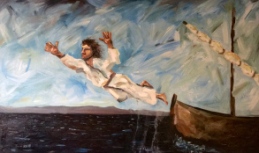 the water” (Matthew 14:28). Now, I wonder what was going through Peter’s mind at that moment. Wasn’t he afraid that some ghost imitating Jesus could have bid him to get out of the boat to his death? Even though his eyes saw a ghost, his ears heard the voice of his Master. His Master bade him “Come.” So Peter got out of his comfort zone and walked on the water. No other man on earth (who was not also God) can make that claim. Peter was walking on water.
the water” (Matthew 14:28). Now, I wonder what was going through Peter’s mind at that moment. Wasn’t he afraid that some ghost imitating Jesus could have bid him to get out of the boat to his death? Even though his eyes saw a ghost, his ears heard the voice of his Master. His Master bade him “Come.” So Peter got out of his comfort zone and walked on the water. No other man on earth (who was not also God) can make that claim. Peter was walking on water.
Then Peter took his eyes off of Jesus. “But when he saw the wind, he was afraid, and beginning to sink he cried out ‘Lord, save me!'” (Matthew 14:30). “When he saw….” To see. The Greek word for saw is βλέπω (blep’-o) which means to look at, behold, beware, 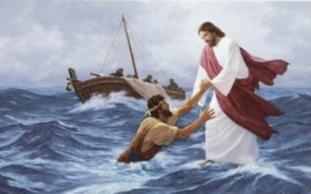 lie, look (on), perceive, regard, see, sight, take heed. As impetuously as he was in leaping out of the boat at the voice of Jesus, Peter now was just as impetuous to regard the wind, and the way it made him feel emotionally. Instead of regarding the one who commands the wind and the waves, his eyes told him “Beware of the wind and waves.” He began to walk by sight and not by faith (2 Corinthians 5:7). He trusted what his eyes were telling him and not in who Jesus is. Jesus reached for Peter, lifted him up. Jesus labeled Peter one of little faith. “Little faith” is translated from one Greek word, όλιγόπιστος (ol-ig-op’-is-tos), meaning incredulous, lacking confidence. Taken from two Greek words, όλιγόπιστος implies “puny conviction.”
lie, look (on), perceive, regard, see, sight, take heed. As impetuously as he was in leaping out of the boat at the voice of Jesus, Peter now was just as impetuous to regard the wind, and the way it made him feel emotionally. Instead of regarding the one who commands the wind and the waves, his eyes told him “Beware of the wind and waves.” He began to walk by sight and not by faith (2 Corinthians 5:7). He trusted what his eyes were telling him and not in who Jesus is. Jesus reached for Peter, lifted him up. Jesus labeled Peter one of little faith. “Little faith” is translated from one Greek word, όλιγόπιστος (ol-ig-op’-is-tos), meaning incredulous, lacking confidence. Taken from two Greek words, όλιγόπιστος implies “puny conviction.”
“Why did you doubt?” (Matthew 14:31). “Doubt,” διστάζω (dis-tad’-zo) meaning to duplicate, to waver (in opinion), to doubt. Peter doubted the power of Jesus. Instead he believed the lie of the wind and waves. Jesus did not refer to Peter’s “little faith” because he required evidence in order to believe. Jesus, of course, does not demand blind faith. The definition of faith is not believing in something without evidence. Faith is putting trust in someone who is trustworthy. Jesus, in fact, gave the disciples (and us) evidence of his power by calming the storm, feeding the 5,000, walking on water, resurrecting from the dead. Requiring evidence is not the issue.
Trust. That is what faith is about. Trust. Is Jesus able to make me walk on water? Has he bid me “Come?”[1] Then what am I waiting for? Do I trust him? Imagine if Peter had not lost confidence in Jesus and kept walking by faith instead of by what his eyes saw. Which disciple would have been next to step out of the boat? Andrew? John? Philip? Could Peter’s demonstration of faith have inspired the rest to step out in faith? They weren’t getting anywhere fast inside the boat. Jesus seemed to be getting along just fine walking on the water.
Peter missed the opportunity to inspire his fellow disciples because he regarded what his eyes saw, instead of the One who bade him “Come.” His impetuous nature led him to a place where he could have demonstrated great faith. Instead, he exhibited little faith. Thankfully, Peter’s story of faith did not end here. The power of the Gospel transformed him. He became a man of great faith, even to the point of preaching the resurrection of Jesus though he knew it would lead to his death.
____________________________________________________________________________________________
[1] Although I am not one who believes that miracles ended with the Apostolic age, I do believe that they are less frequent. God used miracles as evidence for his authority and power. Now that his Word is complete, there is no need for miracles to demonstrate his authority and power. Do we really trust God who has already spoken, or are we like the Pharisees who constantly sought signs, doubting, wavering? Though Jesus has the power to make us literally walk on water, he has not bid us “Come.” My point above about us walking on water is metaphorical, not literal. Let us be careful not to turn Jesus into a glorified magician, who can wow people with parlor tricks.
